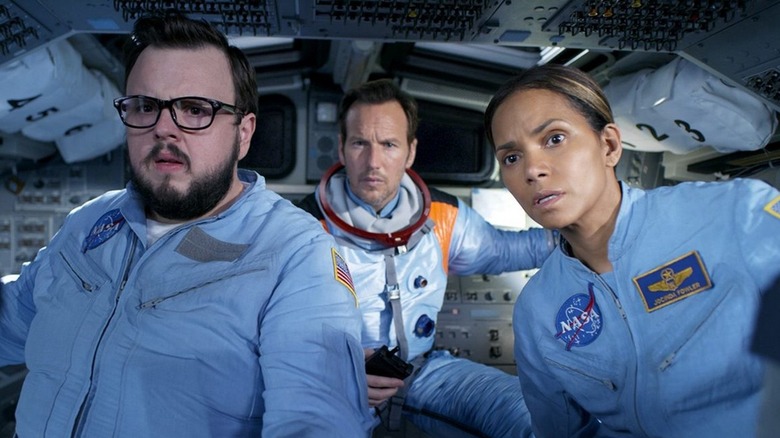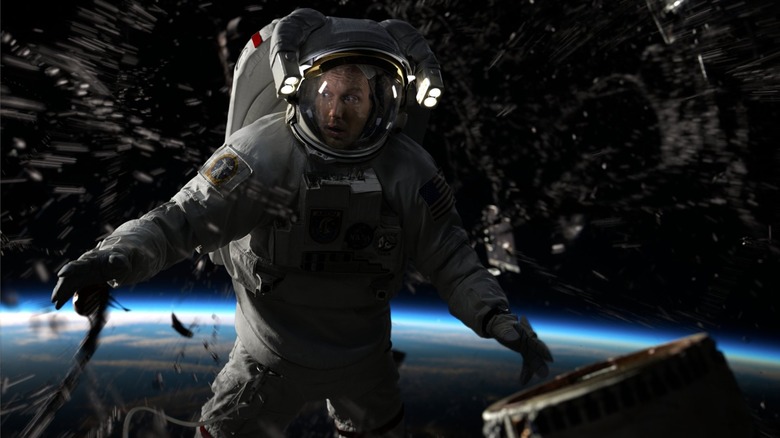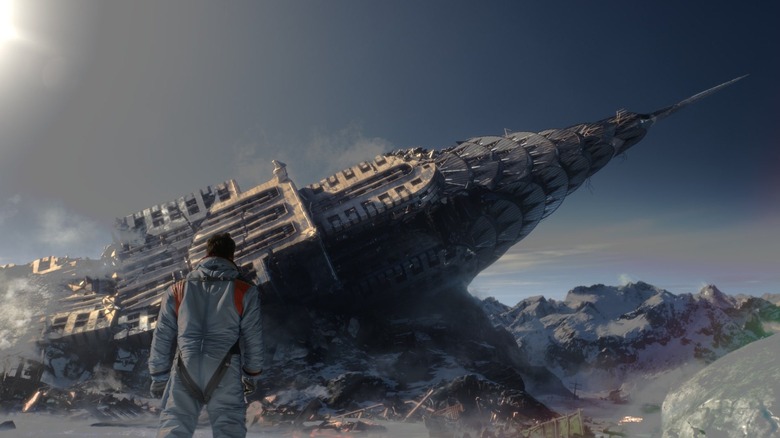Why Moonfall Bombed At The Box Office And What We Can Learn From It
At last measure, Roland Emmerich's "Moonfall" was the 26th biggest box office bomb of all time. Working on an estimated budget of about $140 million, "Moonfall" has only made about $44 million worldwide. Factor in the film's advertising and distribution budget, and it stands to have lost about $139 million.
Some may be old enough to remember a time when a box office bomb of this size would be the biggest news in Hollywood. Notorious bombs like Michael Cimino's "Heaven's Gate" (1980), Willard Huyck's "Howard the Duck" (1986), or Elaine May's "Ishtar" (1987) retain their notoriety to this day, stained forever by their box office failure. A film like "Moonfall," meanwhile, is merely another major bomb in a long series of them. One might even have to fight to remember that it came out earlier this year. For perspective, "Moonfall," when adjusted for inflation, lost about $3 million more than "Heaven's Gate." Mere months later, it is nearly forgotten.
Notable fact: Twelve of the 20 biggest bombs of all time were made after 2010.
"Moonfall" is a throwback to the enormous, boldly dumb disaster films that made Emmerich a household name in the 1990s and early 2000s. The man behind effects-heavy disaster flicks like "Independence Day," "Godzilla," and "The Day After Tomorrow" was back in his element, making a film about how the moon itself is set to scrape up against the Earth ... because it has always secretly been an alien superstructure.
It's clunky, implausible, and incredibly stupid. It's also no less implausible than any of the filmmakers' previous movies. So why did it bomb as badly as it did?
The great '20s streaming dump
Like "Turning Red," "Jungle Cruise," "Mulan," "Wonder Woman 1984," and "The Matrix Resurrections" — films, incidentally, that individually lost more than $140 million apiece — "Moonfall" found itself stranded in the middle of a nascent film release structure brought about by lockdowns and Covid restrictions. The Regal theater chain had to close all of its locations in October of 2020, and the theaters that managed to remain open suffered greatly. While the financial success of something like "Top Gun: Maverick" may give theater-lovers hope that cinemas are officially on the mend, know that numbers are still down across the board. Only the tentpoles still draw crowds.
Some studios, it seems, felt the only way their films could be seen in the middle of closures and skepticism about cinema's future, was to release directly them onto their vertically integrated streaming services. Contractual obligations often required a theatrical release, however paltry, but nothing prevented Warner Bros., say, from releasing "Wonder Woman" onto HBO Max. The new just-get-it-out-there mentality angered many filmmakers, and actress Scarlett Johansson famously sued Disney over their decision to put "Black Widow" onto Disney+ so hastily, as it was a breach of contract that ate into her cut of the film's theatrical revenue.
A new pattern emerged. With many audience members reluctant to return to theaters — and with some filmmakers now lambasting the theater experience as overrated — many studios made the dreaded pivot to video. A lot of big-budget films found their theatrical windows shrinking, and would be made available at home a few months, or even mere weeks after their opening date.
"Moonfall" was one of those movies. It hit theaters on February 4, 2020, and was available to stream by April 1.
Emmerich fatigue
It didn't help that audiences had long been tired of Roland Emmerich's end-of-the-world shenanigans. His brand of bold, clunky, super-slick action never lost its sheen, though his style did seem to fall out of favor at some point. His 2009 film "2012" didn't gather the same cultural fingerhold as his disaster films from a decade previous, his Shakespeare exposé "Anonymous" was risible at best, and his "Independence Day" sequel was something no one asked for. At least 2013's "White House Down" could boast being one of the better "Die Hard" knockoffs.
Critics have been notoriously unkind to Emmerich, and he rarely gets any kind of critical acclaim. "Moonfall" boasts a mere 36% approval rating on Rotten Tomatoes, but that falls in with "Midway" (42%), "Resurgence" (29%), "Stonewall" (9%), "White House Down" (52%), and others. His highest-rated film remains "Independence Day" with a whopping 67% approval.
As mentioned, Emmerich's films tend to skew away from plausibility, and the director loves to play his scenarios as largely as possible. The disasters in his films have become larger and larger over time. "The Day After Tomorrow" featured destructive climate emergencies. "2012" featured the shift of the Earth's crust. "Resurgence" saw a shell being built around the entire planet. Emmerich, in reaching for the skies, landed on the moon, and that appeared to be going too far. Audiences didn't seem willing to accept that the moon was an alien superstructure, or that the rules of science are to be ignored entirely as the moon passes by overhead, sucking human beings off the Earth's surface with its gravitational forces.
There is a thin line between "just stupid enough" and "too stupid."
A skosh too stupid
"Moonfall" clearly crossed that line, as it was a hair too stupid for audiences to accept. A White House takeover or an alien invasion is easy to wrap one's head around. "The Day After Tomorrow" and "2012," while as scientifically accurate as "Lord of the Rings," at least had messages they were trying to convey: beware of climate change, and look past class when it comes to global survival.
"Moonfall" had none of the messaging and all of the stupidity. Humanity does not unite in "Moonfall," and the lessons the main characters learn have nothing to do with overcoming hubris or being more understanding of the natural world. It's idiotic lunacy all the way through. The moon could have been made of green cheese, and the impact would have been the same.
"Moonfall" is also the kind of film that would make Neil deGrasse Tyson have an aneurysm. The only scientific fact "Moonfall" got right is that Earth has a moon. Emmerich seems to have read in a book somewhere that the moon's gravity affects the Earth's tides, and that's about where his research ended. Playful essays have been written as to what would actually happen if the moon fell out of its orbit, and "Moonfall" doesn't even go as far as that.
Really, that may be the biggest reason for its failure. "Moonfall," despite several fun action set pieces, simply didn't have the capability of grabbing audiences any longer. Emmerich's shtick had worn thin, as had the script.
Perhaps it could have weathered its unusual release schedule if the film had been a skosh better.



